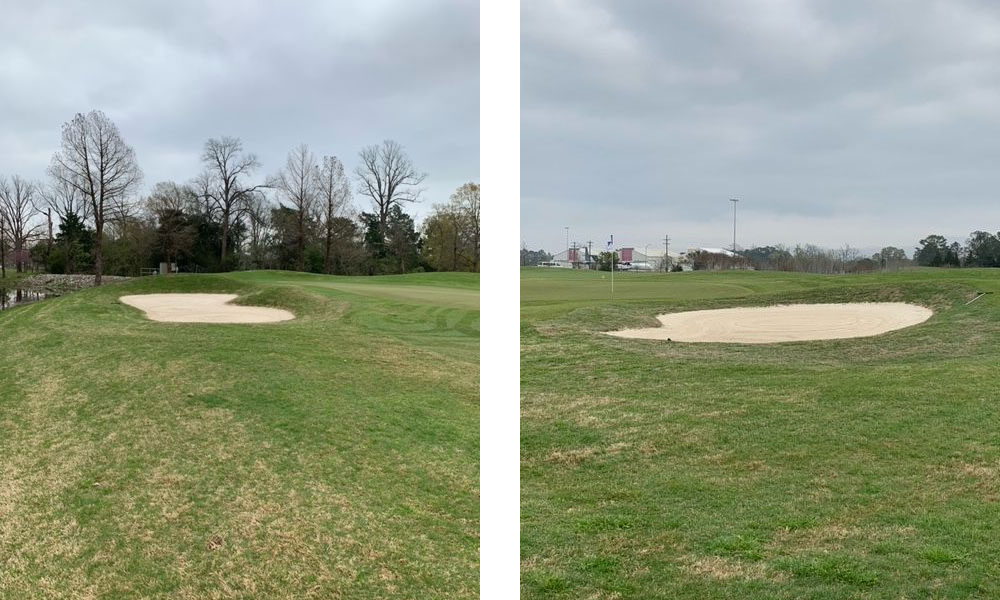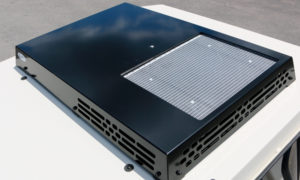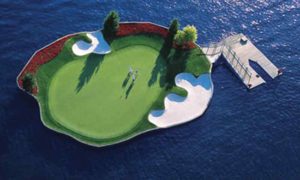“When we had a tournament, before we redid the bunkers, our biggest fear was rain in the days before the event,” says Kyle Swart, superintendent at the semi-private Oakwing course in Louisiana. “If it rained on a Friday and the tournament was on a Saturday, the bunkers would be ground under repair. If the rain came a few days before, my crew would have to spend all their time putting the bunkers back toghether when they should have been preparing the course.”
Located on Heritage Park in Alexandria, central Lousiana, the former England Airforce Basem, the home of the 23rd Fighter Wing, Oakwing was designed by Jim Lipe and opened in 2001. “There isn’t any real military installation here any more, but the England Air Authority owns the land and manages the property,” says Swart. “About 75 per cent of our play is from members.”
Related: Capillary Concrete and Bunkers rebranded to CapillaryFlow!
The course’s bunkers – which are large, with steep faces – had never been properly renovated since opening. “We tried to do our own bunker liner, using concrete, about ten years ago, but it failed,” says Swart. “There were fabric liners installed originally, but they were never going to last twenty years, and before we renovated, we would pull some up with the Sand Pro every now and again.”
Swart researched the options available to him and settled on the Capillary Bunkers product from Capillary Flow. “I didn’t know when there might be another renovation, so decided I had to go for the best long-term option,” he says. “What I like about the Capillary Bunker product is that the entire bunker bottom is covered. It doesn’t matter where water enters the bunker, you know it will always flow down to the drain at the bottom.”
Architect Nathan Crace handled the renovation, and Swart is ecstatic at the results. “Before we started, around fifty per cent of our bunkers simply didn’t drain,” he says. “In the first three months after we renovated, we had 22 inches of rain – we went from an incredibly dry summer to an incredibly wet winter. There is not a bunker out there that has held water or washed out, or retained any silt. They have been the best addition to this golf course.”
He says the benefits to Oakwing will be enormous. “All year long, we were trying to keep sand in the bunkers to a decent depth and now we don’t have to,” he explains. “I have a crew of ten, and it used to take three or four days to get the bunkers back into condition after heavy rain. Now one guy goes out with a rake and in a couple of hours they’re fine. My guys love them! The look on their faces when they come into work after rain has transformed. They used to come in and know they were going to spend the next three or four days in the bunkers. Now, they know they don’t have to.”
But the most dramatic change is to the bottom line. Swart says the savings from his new bunkers will be substantial. “We are going to save $50-70,000 a year just on labour from the new bunkers, and there will be another $12-15,000 from not having to replace sand,” he says. “For us, that is a big, big difference.”
About CapillaryFlow
CapillaryFlow is a technology company whose patented innovations are enabling golf courses sports grounds, and other leisure spaces like city parks to build long-lasting and low maintenance greens, bunkers and grounds. Controlling the water, carbon dioxide and oxygen levels for various soil profiles in these spaces is a major challenge. Our proprietary CapillaryFlow technology offers a simple solution that ensures optimal moisture levels and good drainage regardless of the weather conditions. http://www.capillaryflow.com
Capillary Material is the common factor across most of our solutions including Capillary Bunkers, Capillary Hydroponics and Capillary Geothermal. It is a patented and engineered polymer-based concrete that is the only building material that can move water both up and down to precisely regulate the moisture content of any adjacent material, such as sand or soil.
Capillary Bunkers is recognized as the world’s leading and most advanced bunker liner, and the most durable bunker construction method. It allows water to flow through the base of the bunker while keeping sand on the faces and preventing washouts, keeping bunkers in perfect shape during any weather condition. Over 800 courses around the world have built or renovated their bunkers with Capillary Concrete, including dozens of golf’s top 100 courses.





















